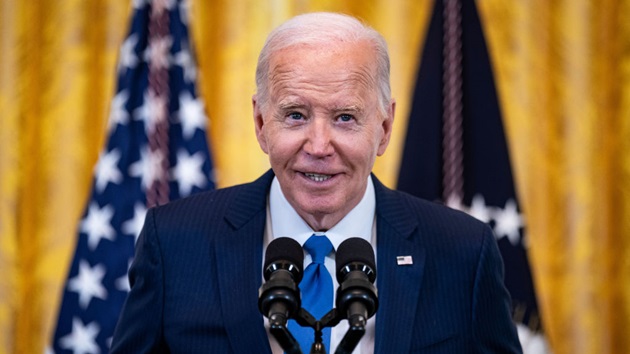
(WASHINGTON) -- Ahead of President Joe Biden making campaign stops on Tuesday in Arizona and Nevada, advisers are laying out why they still place him in a better position than former President Donald Trump to win those two key battlegrounds, despite Biden’s mediocre polling in the early lead-up to the long general election fight.
On a call with reporters on Monday, aides to the president’s reelection bid previewed key areas where, they say, they see Biden having the advantage -- including on abortion and in wooing more moderate and independent voters, some of whom rejected Trump during his Republican primary fight with Nikki Haley.
"Nevada and Arizona are states that President Biden and Democrats won in 2020 and again in 2022. And this year, we have the message and the infrastructure to win yet again," one Biden campaign aide told reporters.
"These are states where voters overwhelmingly support a woman's right to choose and where abortion rights will likely be on the ballot [as well in November] -- and they are benefiting tremendously from the president's policies with tens of thousands of new good-paying jobs in clean energy and chips manufacturing,” the aide argued.
Echoing what is likely to be a key campaign message from Biden throughout the year, another adviser drew a “stark contrast” with the president and “what you see the Trump campaign not doing" in Arizona.
This aide went on to ding the Trump team for, they suggested, failing to connect with non-white voters, though Trump has made specific appeals to Black and Hispanic Americans, including as recently as his Ohio rally on Saturday.
Exit polls from the 2020 race against Biden also show Trump did marginally better with those groups than previous Republican candidates.
Knowing both states have a large population of independent voters, the Biden campaign said it continues to seek out former Haley supporters and moderates and independents not on board with Trump.
"Our campaign is paying attention to that and will be engaging voters very intentionally, to draw that contrast and invite them in,” one of the advisers said.
Meanwhile, Trump continues to hammer Biden over high inflation and immigration as well as a variety of foreign policy issues.
Seizing on what polling shows is broader feeling of economic discontent around the country, despite low unemployment and a strong stock market, among other factors, Trump has also cast himself as the candidate who can bring more prosperity back to everyday voters.
He assailed Biden at Saturday’s rally as the “worst president we’ve ever had.”
When asked if the campaign has reached out ahead of Tuesday's primary to organizers of a planned protest vote in Arizona -- spurred by Biden's handling of the Israel-Hamas war in Gaza -- and whether Biden planned to address it while in the state, an aide offered what's now a canned response to ultimately say they won't take any vote for granted.
"The conflict between Israel and Hamas is painful. It's a difficult situation, and [President Biden] believes and this campaign believes that people have every right to make their voices heard,” the aide said. “And in many respects, the president shares the goal of the many who remain ‘uncommitted,’ which is working toward the end of the violence and working towards a just and lasting peace. That's his focus and the campaign supports that."
The protest movement, focused on urging voters to cast “uncommitted” or similar ballots instead of choosing Biden in the Democratic nominating contests, has gained some traction in a few states, including Minnesota and Michigan.
Uncommitted is also estimated to have won some delegates to the Democrats’ national convention this summer, giving them more of a voice.
Organizers of the protest vote in Arizona are urging Democrats to vote for Marianne Williamson instead of Biden since there isn't an uncommitted or write-in option on the ballot.
The Biden campaign said on Monday that he plans to spend time this week in the battleground counties of Washoe in Nevada and Maricopa in Arizona.
One of the advisers also defended the president so far mixing smaller events with a few larger-scale gatherings, unlike Trump, who favors massive and often headline-making rallies.
"These are strategic events. They allow us to break through a fragmented media environment. We do a lot of digital-first content to reach the voters who they know are sort of deeply disengaged from politics," the aide said. "Smaller retail events support that digital-first content. But I would also flag that we are continuing to do larger events as well. We can do both."
The campaign pitches their electoral path
In a new memo, also released on Monday, campaign manager Julie Chavez Rodriguez wrote that the center of the campaign's "multiple pathways" to 270 electoral votes are three key regions of the country.
Chavez Rodriguez highlighted "the Blue Wall states of Michigan, Pennsylvania, and Wisconsin, western battlegrounds like Nevada and Arizona, and southern states like Georgia and North Carolina," adding they're also focusing on "Colorado, Minnesota, New Hampshire, New Mexico, and Virginia, while expanding the map in places like Florida and Texas."
Five of the states that Biden's campaign manager singled out -- Colorado, Minnesota, New Hampshire, New Mexico and Virginia -- have all become reliably Democratic in past presidential years, suggesting the campaign will be somewhat on the defensive in 2024 in some parts of the country.
Regarding the Southwest, Chavez Rodriguez wrote that the campaign will focus its messaging in the region on abortion rights, job creation and its support from organized labor groups, while Trump allies such as Senate candidate Kari Lake "remain fixated on election denialism."